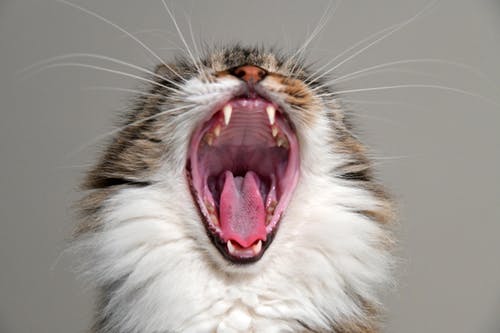Guest post courtesy of Madeleine Innocent. The views and opinions expressed in this article are those of the guest author and do not necessarily represent the views of Val Heart & Heart Communications Enterprises Inc.
Cat gingivitis is more and more common all the time. But what’s interesting is, cats in the wild don’t suffer from gingivitis—if they did, they would quickly die because they wouldn’t be able to feed themselves without the veterinary care that domesticated cats enjoy.
So, in order to determine the best cures and treatments for cat gingivitis, this is the direction we need to be looking in.
What is cat gingivitis?
To put it simply, cat gingivitis is inflammation of the gums. It can occur at any age in any breed. Not only is cat gingivitis a painful problem, but it is also a big blinking sign letting you know that the overall health of your cat is not what it should be.
It’s also an indicator that the teeth are going to be a problem as well, sooner or later. They could loosen and then fall out.
Cat gingivitis sounds pretty grim. And the truth is, it is unnecessary pain and suffering that your cat doesn’t need to go through. With the following two measures, you can prevent cat gingivitis or else restore balance if it is already progressing.
Are you interested in learning how to really communicate with your pets, so you improve life quality for them and for you? Click here to check out all of my online courses, and get started now!
Two natural ways to prevent cat gingivitis
The first thing any natural health professional will try to do is restore a healthy immune system in your pet. Once balance is established in the whole system, everything else will slip back into a natural order, including your cat’s dental health.
1. Diet

One of the main causes of cat gingivitis is diet.
Diet is critical to everyone’s health, not just humans. Human diets can be shoddy at best, but at least there are some basic laws in place that govern the manufacturing and marketing of human food.
Unfortunately, these regulations do not exist in pet food; the pet food market is a free-for-all, and anything can, and does, occur. For example:
- preservatives that are highly toxic, despite any claims on the packet
- high-fat products that are unusable in human food
- low-grade meat by-products (rejects from human consumption, with questionable protein content)
- cheap filler such as melamine, sugar or crushed nutshells
Please don’t think the processed food recommended by your veterinarian is any better. It’s not. Veterinarians have little formal training in cat nutrition, and are often swayed by cat food manufacturers to promote their food as a way to boost their practice’s revenue.
Go raw!
On the other hand quality, raw meat and bones provide a cat with complete and balanced nutrition. Crunching up small raw bones keeps their teeth clean, their gums healthy and their minds happy. Dry food doesn’t come close to achieving this, despite any claims otherwise.
The truth is, cats on this diet rarely suffer from gingivitis.
2. Mercurius
While you are transitioning to a quality raw diet, your pet might need some immediate help with their cat gingivitis. The homeopathic medicine Mercurius can be used successfully in restoring healthy gums when the cat’s symptoms include:
- red and swollen gums
- the mouth appears dirty
- excess salivation
- ulceration may or may not be present
- symptoms are worse at night
Be Aware of the Connection Between Cat Gingivitis and Vaccinosis
Vaccinations and over vaccinating can be an underlying systemic and chronic cause of gingivitis and cat gum diseases. Until your cat has a healthy mouth, it’s a good idea to pause on their vaccinations. In fact, one of the reasons using the homeopathic Mercurius works so well is that it helps neutralize vaccinosis problems.
It can be awful watching your beloved friend suffer from cat gingivitis. If you try these two natural solutions, you can help to prevent cat gingivitis from happening, and save yourself lots of time and money at the veterinarian’s office!
Author: Madeleine is a natural health consultant, specializing in homeopathy. She treats both people and animals. She is as passionate about natural, wholesome food as she is about a natural approach to health. Madeleine writes weekly ezines about how to achieve natural good health with simple, home prescribing and diet. Madeleine has been writing on natural health and homeopathy since 1997. Her hobbies include being with animals, being in nature, self-development, empowering others. She likes to be able to laugh at herself.
https://learnhowtotalktoanimals.com/all-online-courses/
Enjoyed this article? Here are three more you might find helpful:
Time travel is the best superpower to help abused animals heal negative emotions.
The three fundamental animal talk principles.
Animal communication training; protect your pet from predatory pests.
This article has been updated from a previously published version.
. . .
Affiliate Disclaimer: This post contains affiliate information which means that I’ll earn a small commission if you purchase at no extra cost to you.






Dear Val,
My cat, Lola is suffering from gingivitus caused by calici virus. A year and a half ago she had her teeth cleaned and the vet insists she has to have it done again as soon as poss,
I gave her Mercurious Solubilis but it didnt help. Could I give her Cistus Incanus tea?
I give her raw organic chicken and a quarter tsp brewers yeast and 3x a week the yolk of an organic egg for breakfast.
But she wont eat the same thing for supper so I give her raw wild caught salmon 2x a week and cooked wild caught fish 4x a week and grain free organic dried food 1x a week and she also loves boiled veg with butter. She doesn´t eat the raw organic chicken bones I give her (because once they got stuck in her throat and I stopped giving them to her and now she doesnt want them.
I have 12 rescue cats in my home and one by one they are all starting to get gingivitistomavitis – my wonderful Nargie has the worse case ….for example I have to take her every two weeks for injections as oral treatment doesn’t work …..I feel SO bad and guilty for her ….guilty because of my ignorance and had been giving her supermarket dry food ….now I give them all much higher quality vet food now. I’m giving them all Metacam as well and a lot of teeth have been pulled ….I would be so grateful for your help ….I live in Spain, Europe
Hello,
My cat has recurring gum ulcers, and I am concerned that his walmart, processed cat food is contributing to the problem. What do you recommend please? I am so worried about him.
Thank you so much,
Ellen
Dear Madeline;
I have a tuxedo female spayed cat about 7 years old now who has had a long term dental health problem with gingivitis and possible abscess. Some of that is due to the fact that my husband and I have been under an extreme financial challenge to provide veterinary care for her due to a prolonged financial hardship. This makes it even more upsetting and challenging to find a healing path that doesn’t involve the huge financial expense of veterinary care as well as the type of care and diagnosis that is administered. I had the experience of taking one my male tuxedo cats to a veterinary hospital years ago with a similar situation and they wanted to pull all of my cats teeth which was totally unnecessary. Because I was not in complete agreement with this, I was both threatened and subsequently reported to the local branch of the ASPCA who had someone come out to examine my care of my animal which I thought was rather high handed of the veterinary clinic and has made me even more cautious of who to trust.
I have been feeding her non grain Weruva and Wellness foods both dry and wet with 500 mg of Ester C and Solid Gold Cat Sea Meal supplement mixed in for lack of any other plan that I can transition her to. She has not transitioned to raw food successfully yet.
Although, my husband and I are still trying to dig out or our financial situation, I feel that if I could just get her on track with the proper raw diet and supplements, this could at least offer a healing path she could start on until the right veterinary care can be found.
There are so many feline foods and products on the market which can amount to quite a bit of expense for those of us that are financially challenged but at the same time love our pets and want to do something for them. I am not familiar with Mercurius of which you referenced in your article and wondered where I could purchase it and if adding it to any dietary recommendations could help my cat.
I would be sooo appreciative of your response to my comment and how I could at least start my cat back on to a road of health.
Thanks so much!
Gail
Dear Madeline;
I have a tuxedo female spayed cat about 7 years old now who has had a long term dental health problem with gingivitis and possible abscess. Some of that is due to the fact that my husband and I have been under an extreme financial challenge to provide veterinary care for her due to a prolonged financial hardship. This makes it even more upsetting and challenging to find a healing path that doesn’t involve the huge financial expense of veterinary care as well as the type of care and diagnosis that is administered. I had the experience of taking one my male tuxedo cats to a veterinary hospital years ago with a similar situation and they wanted to pull all of my cats teeth which was totally unnecessary. Because I was not in complete agreement with this, I was both threatened and subsequently reported to the local branch of the ASPCA who had someone come out to examine my care of my animal which I thought was rather high handed of the veterinary clinic and has made me even more cautious of who to trust.
I have been feeding her non grain Weruva and Wellness foods both dry and wet with 500 mg of Ester C and Solid Gold Cat Sea Meal supplement mixed in for lack of any other plan that I can transition her to. She has not transitioned to raw food successfully yet.
Although, my husband and I are still trying to dig out or our financial situation, I feel that if I could just get her on track with the proper raw diet and supplements, this could at least offer a healing path she could start on until the right veterinary care can be found.
There are so many feline foods and products on the market which can amount to quite a bit of expense for those of us that are financially challenged but at the same time love our pets and want to do something for them. I am not familiar with Mercurius of which you referenced in your article and wondered where I could purchase it and if adding it to any dietary recommendations could help my cat.
I would be sooo appreciative of your response to my comment and how I could at least start my cat back on to a road of health.
Thanks so much!
Gail